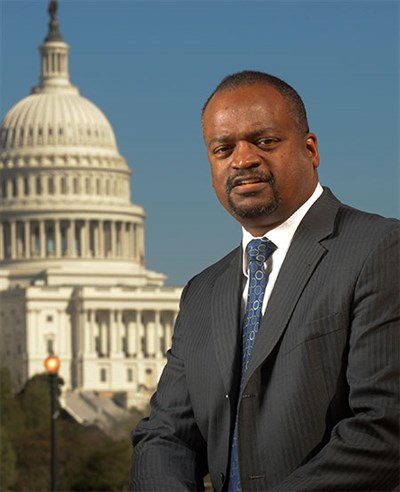Federal Judge Robert L. Wilkins to Present RHIT’s Commencement Address

Distinguished Alumnus: Robert Wilkins, a 1986 chemical engineering graduate, is a judge of the prestigious U.S. Court of Appeals for the District of Columbia Circuit. He also helped establish the National Museum of African American History and Culture.
Federal judge and African-American historian Robert L. Wilkins, instrumental in the opening of the National Museum of African American History and Culture, will return to his alma mater to give the Commencement Address on May 27 to Rose-Hulman’s 2017 graduating class.
Wilkins is a judge on the U.S. Court of Appeals for the District of Columbia Circuit, which has had major influence on U.S. law and frequently hears litigation involving U.S. federal agencies. Three of the eight current justices on the U.S. Supreme Court are alumni of the D.C. Circuit.
Before his appointment in 2014, Wilkins served as a judge on the U.S. District Court for the District of Columbia and was a partner with the Washington, D.C.-based Venable LLP law firm, specializing in white collar defense, intellectual property, and complex litigation cases. The Harvard Law School graduate also practiced at the Public Defender Service in the nation’s capital. He won a landmark civil rights lawsuit against the Maryland State Police that inspired nationwide legislative and executive reform of racial profiling by law enforcement agencies.
Wilkins earned a bachelor’s degree in chemical engineering from Rose-Hulman in 1986, receiving the Herman A. Moench Commendation as the institute’s most distinguished graduating senior. His professional achievements and service to Rose-Hulman earned him an honorary degree in 2014 and the Alumni Association’s Honor Alumnus Award in 2005. He also was the featured speaker for Rose-Hulman’s Martin Luther King Jr. Celebration Week in 2008.
“Robert Wilkins has been one of our most honorable, distinguished and faithful alumni,” notes President Jim Conwell. “His dedication to Rose-Hulman and support of our principles of cultural diversity and inclusiveness are helping us become a stronger community that reflects our world.”
Wilkins, a Muncie, Ind., native, played a key role in the establishment of the Smithsonian National Museum of African American History and Culture, which opened last fall on the National Mall in Washington, D.C. He served as chairman of the site and building committee of the presidential commission whose work led to the congressional authorization of the museum and the selection of its location. Wilkins chronicled the arduous path to the museum’s creation in his book, Long Road to Hard Truth: The 100 Year Mission to Create the National Museum of African American History and Culture.

